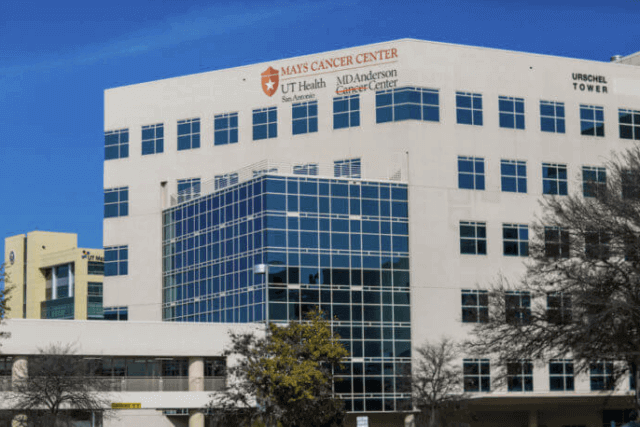Contact: Eileen Teves, 210-450-7239, tevese@uthscsa.edu
SAN ANTONIO – Mays Cancer Center, home to UT Health San Antonio MD Anderson Cancer Center, proudly announces the launch of a specialized chemotherapy delivery system called hepatic artery infusion, also known as HAI pump therapy, for colorectal cancer patients whose tumors are inoperable and have spread to the liver.
Approved by the US Food and Drug Administration, the hepatic artery infusion (HAI) pump is a palm-sized device implanted below the skin in the abdomen while the patient is under anesthesia. It is designed to deliver high doses of chemotherapy safely and effectively to patients living with colorectal cancer and bile duct cancer (intrahepatic cholangiocarcinoma) which have spread to the liver.
The device continuously administers chemotherapy directly through the hepatic artery, a vessel that provides blood to the liver. HAI therapy benefits patients by reducing the tumor and improving control of the disease in the liver.

“Having HAI therapy available at the Mays Cancer Center to treat patients whose cancer cannot be removed completely through surgery is pivotal,” said Colin Court, MD, PhD, surgical oncologist and assistant professor at The University of Texas Health Science Center at San Antonio. “This therapy gives our patients hope, limiting toxicity elsewhere in the body, and allowing them to continue their daily activities without disruptions.”
A National Cancer Institute (NCI)-designated Cancer Center, Mays Cancer Center is currently only one of two facilities in Texas offering HAI therapy. Before Mays Cancer Center, patients traveled to Harold C. Simmons Comprehensive Cancer Center in Dallas. Offering hepatic artery infusion therapy locally gives patients from San Antonio and throughout South Texas an opportunity to receive care close to home.
Before HAI therapy, patients received traditional chemotherapy, administered through a vein and into the bloodstream to reach the liver. HAI therapy is localized and precisely targets tumors. It delivers up to 400 times higher drug concentration than standard chemotherapy, limiting side effects elsewhere. Once implanted in the body, the pump is designed not to run out of power because it will be powered by the patient’s body heat which activates the pump to deliver medicine. The HAI pump will remain in place for the length of the required therapy, depending upon doctor consultation and a customized treatment plan.
A multidisciplinary team of medical and surgical oncologists, including nurses, is required when managing and deciding on a patient’s treatment. A medical oncologist is in charge for the duration of the treatment or the lifetime of the therapy. Treatment consists of bi-weekly refills, routine lab testing, and any necessary dose adjustments.
Colorectal cancer is the fourth leading cause of cancer death in the United States, with more than 150,000 people newly diagnosed every year. When a patient’s colorectal cancer has metastasized beyond the lymph nodes, this is considered stage 4 cancer. Many patients with stage 4 colorectal cancer can be helped or even cured by surgery, or other locoregional therapies such as HAI.
For more information about cancer programs at the Mays Cancer Center, visit MaysCancerCenter.org/CancerPrograms.
The University of Texas Health Science Center at San Antonio (UT Health San Antonio) is one of the country’s leading health science universities and is designated as a Hispanic-Serving Institution by the U.S. Department of Education. With missions of teaching, research, patient care and community engagement, its schools of medicine, nursing, dentistry, health professions, graduate biomedical sciences and public health have graduated more than 42,200 alumni who are leading change, advancing their fields and renewing hope for patients and their families throughout South Texas and the world. To learn about the many ways “We make lives better®,” visit UTHealthSA.org.
Stay connected with The University of Texas Health Science Center at San Antonio on Facebook, Twitter, LinkedIn, Instagram and YouTube.
The Mays Cancer Center, home to UT Health San Antonio MD Anderson Cancer Center, is one of only four National Cancer Institute-designated Cancer Centers in Texas. The Mays Cancer Center provides leading-edge cancer care, propels innovative cancer research and educates the next generation of leaders to end cancer in South Texas. To learn more, visit UTHealthsaMDAnderson.org.
Stay connected with the Mays Cancer Center on Facebook, Twitter, LinkedIn, Instagram and YouTube.



